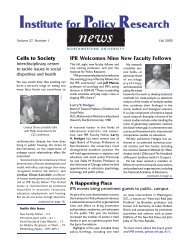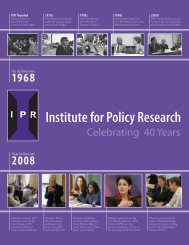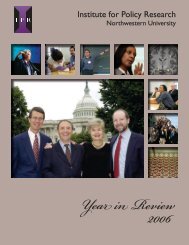Highlights of 2011 - Institute for Policy Research - Northwestern ...
Highlights of 2011 - Institute for Policy Research - Northwestern ...
Highlights of 2011 - Institute for Policy Research - Northwestern ...
Create successful ePaper yourself
Turn your PDF publications into a flip-book with our unique Google optimized e-Paper software.
Quantitative Methods <strong>for</strong> <strong>Policy</strong> <strong>Research</strong><br />
Experiments in Political Science<br />
Druckman is co-editor <strong>of</strong> the first comprehensive overview<br />
<strong>of</strong> how experimental research is trans<strong>for</strong>ming political science.<br />
Published by Cambridge University Press, the Cambridge Handbook<br />
<strong>of</strong> Experimental Political Science (<strong>2011</strong>) <strong>of</strong>fers methodological<br />
insights and groundbreaking research from 30 <strong>of</strong> the discipline’s<br />
leading experimentalists, including Druckman, Shanto<br />
Iyengar and Paul Sniderman <strong>of</strong> Stan<strong>for</strong>d, Alan Gerber <strong>of</strong> Yale,<br />
Donald Green <strong>of</strong> Columbia, and Diana Mutz <strong>of</strong> the University<br />
<strong>of</strong> Pennsylvania. The handbook aims to ensure that political<br />
science experiments are conducted with the highest level <strong>of</strong><br />
intellectual rigor, thereby enabling political scientists to provide<br />
policymakers with significant data and conclusions. The volume<br />
came together after a May 2009 conference at <strong>Northwestern</strong><br />
University and also features contributions from IPR associates<br />
Daniel Diermeier and Dennis Chong (see p. 61).<br />
Framing and Obesity-Related Behaviors<br />
A variety <strong>of</strong> persuasive communications and interventions<br />
have been explored as possible means to prevent or reduce<br />
obesity. One persuasive message variation that has been<br />
<strong>of</strong> interest to researchers in this domain is the contrast<br />
between gain-framed and loss-framed appeals. A gain-framed<br />
appeal emphasizes the advantages <strong>of</strong> compliance with the<br />
advocated action, whereas a loss-framed appeal emphasizes<br />
the disadvantages <strong>of</strong> noncompliance. Work by communication<br />
studies researcher and IPR associate Daniel O’Keefe and his<br />
colleagues provides a meta-analytic review <strong>of</strong> the accumulated<br />
experimental research concerning the relative persuasiveness<br />
<strong>of</strong> gain-framed and loss-framed appeals <strong>for</strong> influencing various<br />
obesity-related behaviors. The results showed that gain-framed<br />
appeals were significantly more persuasive than their lossframed<br />
counterparts <strong>for</strong> messages encouraging physical activity.<br />
But the researchers found no evidence that either gain- or lossframed<br />
appeals held any persuasive advantage in influencing<br />
healthy eating behaviors. They advised designers <strong>of</strong> messages<br />
aimed at specifically obesity-relevant eating practices not to<br />
spend much time worrying about whether those messages are<br />
gain- or loss-framed.<br />
Statistical Theories <strong>for</strong> Census Data<br />
A new project led by IPR statistician Bruce Spencer with IPR<br />
economist Charles F. Manski will address fundamental problems<br />
<strong>for</strong> government statistical agencies: how to understand the value<br />
<strong>of</strong> the statistics they produce, how to compare value to cost to<br />
guide rational setting <strong>of</strong> statistical priorities, and how to increase<br />
value <strong>for</strong> a given cost. Because data use is so complicated and<br />
difficult to study, Spencer argues that new theory is needed so<br />
that case studies <strong>for</strong> use <strong>of</strong> data in policymaking and research in<br />
the social, behavioral, and economic sciences can be developed,<br />
analyzed, and interpreted. The practical implications <strong>of</strong> research<br />
findings are important <strong>for</strong> statistical agencies, both in the long<br />
term and the short term, to understand and communicate<br />
the value <strong>of</strong> data programs the agencies might seek to carry<br />
out. Supported by a grant from the U.S. Census Bureau, the<br />
researchers propose to extend and apply statistical decision<br />
theory, including cost-benefit analysis, to attack such basic<br />
questions <strong>of</strong> the statistical agencies. The research will focus<br />
on data use, data quality, data cost, and optimization, and the<br />
findings will be applied to problems <strong>of</strong> the U.S. Census Bureau<br />
with the goal <strong>of</strong> carrying out a cost-benefit analysis <strong>of</strong> the 2020<br />
census, which is facing severe cost constraints.<br />
Sampling Theory and Methodology <strong>for</strong><br />
Networks<br />
Government data collections are tempting targets <strong>for</strong> budget<br />
cutters—not because the budgets are so large, but because<br />
ignorance about data use makes the effects <strong>of</strong> data reductions<br />
hard to see. There is a reason that so little is known about data<br />
use, however. Inferring the impacts <strong>of</strong> data use is a problem <strong>of</strong><br />
assessing the causal effect <strong>of</strong> an intervention—people either<br />
observe what happened when the data program was conducted,<br />
or what happened when it was not conducted, but not both.<br />
Spencer is currently reviewing the state <strong>of</strong> knowledge about<br />
whether and how data are used, including both theoretical and<br />
empirical research. His work pays particular attention to the<br />
effects <strong>of</strong> data quality.<br />
Human Capital Forecasting<br />
IPR economist Charles F. Manski (left) clarifies his use <strong>of</strong> partial<br />
identification analysis in a study <strong>of</strong> deterrence and the death<br />
penalty with IPR statistician Bruce Spencer.<br />
Spencer is working on estimates and <strong>for</strong>ecasts <strong>for</strong> selected<br />
areas <strong>of</strong> human capital, such as those that categorize U.S.<br />
workers employed in science and technology jobs according<br />
to skill. Past studies <strong>of</strong> U.S. educational attainment have<br />
51

















